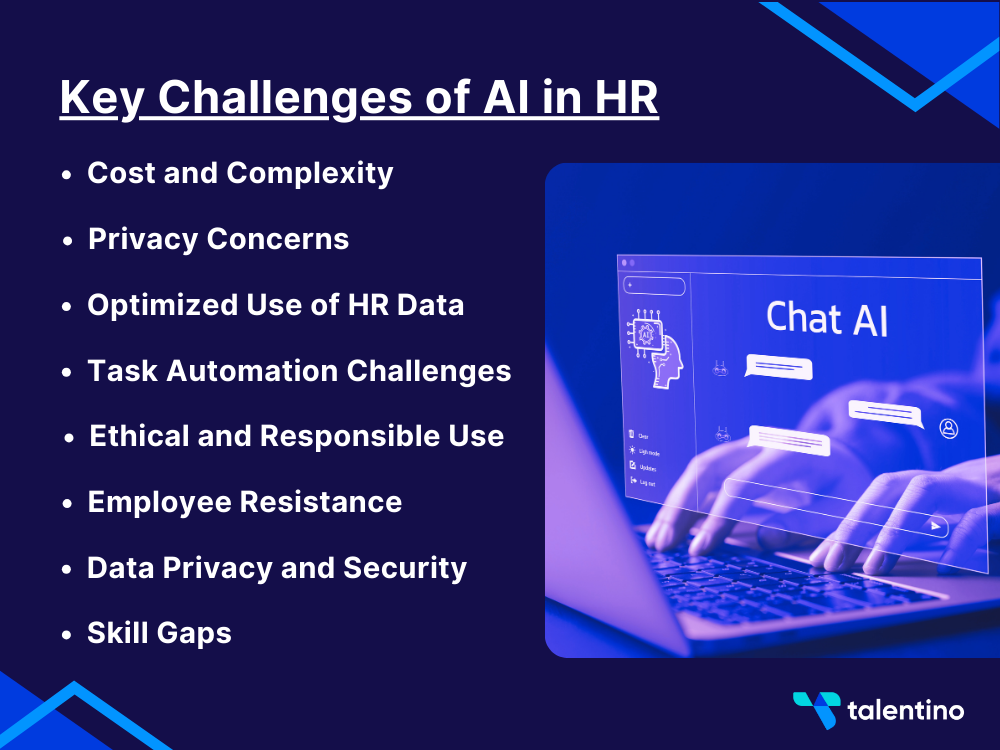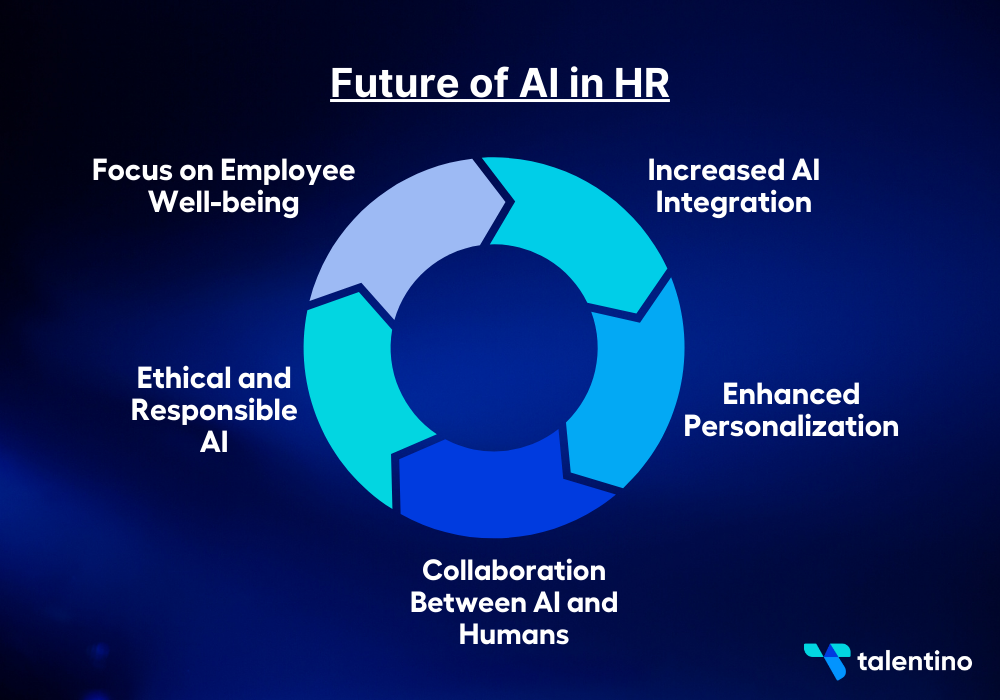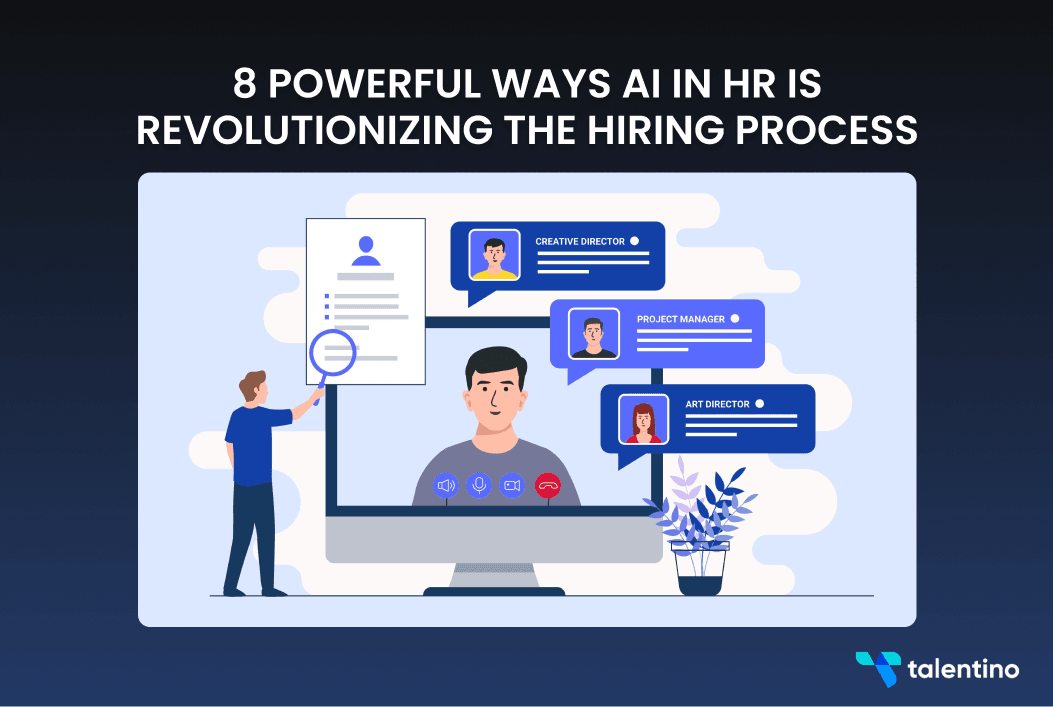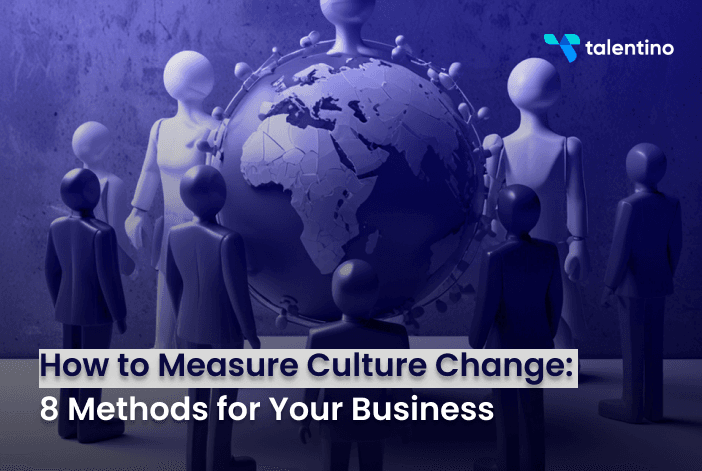The recruitment system is undergoing an evolution, and AI is at the forefront of it. In a race to quicken the pace of hiring, organizations are looking for AI assistance.
In 2023, the size of the AI in the HR market was 5.28 Billion dollars. In 2024, it will mature to 6.18 Billion dollars, a very impressive growth rate of 17.1 percent. It is forecasted that the market will hit $11.63 billion by 20281.
These numbers indicate the increasing confidence in AI’s ability to optimize recruitment processes. The pressure of time is altogether avoided by the use of AI making the process of recruitment brief and efficient.
Let’s explore powerful ways AI is revolutionizing the hiring process and making recruitment convenient. Plus, we will also discuss the challenges amid the rising use of AI in HR methods in this blog.
8 Powerful Ways AI in HR is Revolutionizing the Hiring Process
| Aspect | Explanation |
| Speed in Hiring | Fast hiring secures top talent, reduces costs, and maintains workflow efficiency. |
| Swift Screening | AI automates resume screening, filters candidates, and saves time. |
| Enhanced Evaluation | AI assesses key traits, improving hire quality and outcomes. |
| Automation of Tasks | AI handles scheduling and inquiries, reducing administrative work. |
| Enhanced Candidate Experience | AI personalizes communication, improving engagement and the recruitment experience. |
| Promoting Fairness | AI anonymizes resumes, reducing bias and promoting diversity. |
| Addressing AI Bias | Regular monitoring ensures AI aligns with company values and maintains fairness. |
| Leveraging Data | AI predicts hiring needs, enabling strategic recruitment planning. |
| Continuous Improvement | AI learns from feedback, refining strategies for better talent acquisition. |
Speed in hiring matters. Fast hiring secures top talent before competitors can. Delays can mean losing skilled candidates. A quick process also reduces the cost of open positions. It keeps the workflow smooth and meets business needs. In today’s market, speed is crucial to stay ahead and succeed.
1. Swift and Efficient Screening
AI automates resume screening through tools like applicant tracking systems (ATS). These systems filter out unqualified candidates using predefined criteria. This automation drastically reduces the manual workload. Recruiters no longer need to spend hours reviewing each resume. AI handles this, freeing up time.
According to SHRM, 85% of employers using AI report significant time savings. This allows recruiters to focus on top-tier candidates, enhancing the hiring process.
2. Enhanced Candidate Evaluation
Early AI adopters in recruitment have reduced their cost per screened candidate by 75%. AI evaluates candidates using data-driven assessments. It analyzes performance data to identify key traits and skills linked to job success.
Tools using AI in HR enhance candidate selection by focusing on relevant competencies. This ensures that high-quality candidates are identified early in the process. As a result, AI improves the quality of hires. Recruiters can trust that they are progressing with the best candidates, leading to better hiring outcomes.
3. Automation of Routine Tasks
AI automates routine tasks in HR. It handles interview scheduling and follow-up communications efficiently. AI tools like chatbots manage routine inquiries, which improves the candidate experience.
By automating these tasks, AI reduces administrative burdens. HR professionals can focus more on strategic tasks rather than mundane duties. This shift allows HR teams to dedicate their time to more impactful work.
4. Enhancing the Candidate Experience
AI personalizes interactions with candidates. It tailors communications, boosting engagement. AI avatars provide feedback and updates throughout the recruitment process. This personalized approach keeps candidates informed and engaged.
It enhances their overall experience, making the recruitment process smoother and more responsive to individual needs. AI’s ability to connect personally with candidates contributes to a positive hiring journey, which is crucial in today’s competitive job market.
5. Promoting Fairness and Diversity
AI promotes fairness by anonymizing resumes. It removes personal details like names, gender, or ethnicity, which reduces bias. This helps companies hire based on skills and experience, not demographic factors. AI ensures objective evaluations, focusing on merit. This promotes diversity and creates a more inclusive workforce.
According to a Career Builder survey, 92% of respondents considered ethical issues such as bias and privacy crucial when implementing AI in HR. By focusing on qualifications, AI drives fairer recruitment processes.
6. Addressing AI Bias Concerns
AI systems, however, can still carry bias from their programming. Monitoring and refining these systems is crucial to prevent bias from creeping in. HR teams must ensure that AI-driven decisions align with company values and diversity goals. Regular reviews of AI algorithms help maintain fairness, ensuring they continue supporting unbiased hiring practices. This approach strengthens trust in AI and its role in creating equitable hiring processes.
7. Leveraging Historical Data
AI leverages historical data to enhance hiring. It uses predictive analytics to forecast future hiring needs and trends. This data-driven approach allows companies to plan more strategically.
Instead of reacting, HR teams can proactively align recruitment efforts with business goals. Personio says 60% of business leaders plan to boost their HR with AI in the next five years. This shift reflects AI’s role in enabling more informed, strategic hiring decisions.
8. Continuous Improvement in Hiring Strategies
AI systems improve continuously by learning from data and feedback. They refine recruitment strategies over time, optimizing talent acquisition. Feedback loops help AI adapt, ensuring hiring processes evolve with changing needs.
This improvement leads to better hiring outcomes, as AI fine-tunes strategies to attract the best talent. By embracing AI, companies can enhance their recruitment efforts, making them more effective and efficient in the long run.
Key Challenges of AI in HR

According to the Gartner review, only about 38% of HR leaders have tried or implemented AI solutions. As AI transforms HR, navigating challenges like data security and ethical concerns becomes crucial. Addressing these issues ensures responsible and effective AI use.
Cost and Complexity
AI adoption in HR is still in its early stages. Implementing AI solutions can be expensive, requiring significant investment in technology and training. Many leaders, therefore, need to be more open due to concerns over costs and the complexity of integration. This hesitation slows down AI’s broader acceptance in HR.
Privacy Concerns
Privacy is another significant issue. Employees may resist sharing personal information because of fears that AI systems will misuse it. This distrust challenges HR when implementing AI in sensitive data management and decision-making areas.
Optimized Use of HR Data
HR data practices lag behind other fields. This slow evolution limits AI’s potential in HR. Improving data collection and management is necessary for AI to work effectively in HR functions.
Task Automation Challenges
AI can automate repetitive tasks, but this raises concerns among HR professionals. Many fear that automation might lead to job loss. This fear fuels resistance to AI adoption and slows down its implementation.
Ethical and Responsible Use
Ethical concerns surround AI use in HR. AI systems can carry biases that lead to unfair practices, especially in hiring. There’s still much to learn about AI’s impact on equity, diversity, and inclusion (EDI). Ensuring ethical AI use remains a challenge.
Employee Resistance
Employees often resist AI because they fear it will replace them or reduce the human touch in HR. This resistance is a major barrier to AI integration. Addressing these fears is crucial for smoother adoption.
Data Privacy and Security
AI systems in HR deal with sensitive employee data. Ensuring data privacy and security is a complex issue. Organizations must comply with regulations and protect data, adding another challenge to AI implementation.
Skill Gaps
Many HR professionals lack the skills needed to manage AI technologies. They may need technical training to operate AI systems and soft skills to maintain human-centered HR approaches. Bridging this skill gap is essential for effective AI use.
AI can improve HR functions, but challenges remain. Organizations must address these issues carefully to ensure successful AI implementation in HR. Ethical practices, privacy concerns, and employee resistance must be tackled. Also, investing in skill development is key to overcoming these hurdles.
Future of AI in HR

The future of AI in HR promises deeper integration and innovation. As technology evolves, HR must adapt to new tools and redefine its role.
Increased AI Integration
AI will take over a wider scope of human resources. AI systems will perform more recruitment, interviewing, and employee retention work. These days, they will use AI to streamline tedious procedures and facilitate business decisions with facts.
Enhanced Personalization
AI will further understand employees’ needs and offer reasonable services. Improvements in machine learning will help human resource systems engage with the human workforce more productively. This will result in efficient learning through appropriate courses, the development of applicable systems, and interesting intro sessions.
Collaboration Between AI and Humans
In the coming years, the integration of AI into HR processes will be streamlined with the engagement of the HR staff. While AI will handle the boring tasks, it will be upon HR to take care of activities that require high levels of emotional intelligence and strategic management. This needs to be the order of things so that AI helps HR and does not eliminate the needed human aspect.
Ethical and Responsible AI
With more AI sophistication, more measures will be taken to curb the malpractices. It is up to the organizations to make sure that AI technologies are morally competent and do no harm to society. Moreover, specialist supervision will have to be done to the AI to keep within the moral ethics and ethnic balance.
Focus on Employee Well-being
In addition to their operational importance, AIs will prevent harm to employees’ organs or psyche. AI systems assist the HR team in improving work settings by assessing stress levels, productivity, and employee engagement. This concern for well-being will promote job satisfaction and retention, enabling AI to be useful in employee welfare.
Conclusion
In recent years, the exposure of AI has been changing the HR domain, specifically the hiring process, in more efficient and smarter ways. The tools allow organizations to achieve new levels of productivity and fairness in recruiting. The new course of evolution for HR is using AI in various ways and ensuring every business and candidate benefits from it.
If you’re ready to change the way you hire for the better, your solutions are here at Talentino.ai. Contribute to the recruitment process’s bottom line and improve the quality of the applicants and your company’s standings on the job market. Sign up with Talentino.ai now and be part of future recruitment and onboarding processes.
FAQs
- How is AI being used for HR?
AI automates tasks like resume screening, interview scheduling, and candidate evaluations. It helps HR teams make data-driven decisions, reducing bias and improving hiring and employee management efficiency. - What AI tools are used in HR?
Common AI tools in HR include applicant tracking systems (ATS), AI-driven chatbots for candidate interaction, and predictive analytics platforms that assess employee performance and potential. - Can HR be replaced by AI?
AI can automate many HR tasks, but it cannot replace the human touch needed for roles that require empathy, complex judgment, and strategic decision-making. AI complements HR, making it more efficient. - What is an example of generative AI in HR?
Generative AI in HR can create personalized training content or draft job descriptions based on specific criteria, helping to streamline and customize various HR processes. - Which company uses AI in HR?
Companies like Unilever, IBM, and Hilton use AI in their HR operations to improve recruitment efficiency, enhance employee experiences, and manage talent more effectively.


